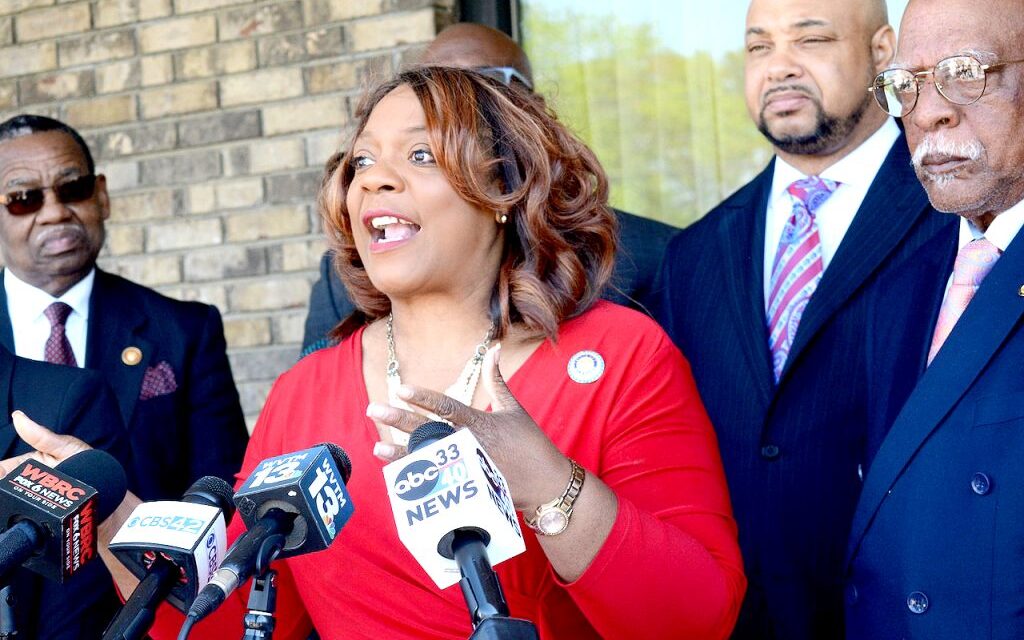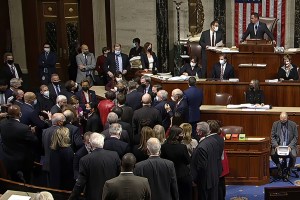Mike Cason
State Sen. Merika Coleman said Miles College is working to organize a consortium of HBCUs to purchase the campus of Birmingham-Southern College, which is closing May 31.
Coleman talked about the idea on the Senate floor on Thursday during discussions of the state education budget. In a brief interview after that, the senator said Miles College President Bobbie Knight talked to presidents of HBCUs across the state in a conference call about the possibilities of the BSC campus.
Coleman is a longtime political science professor at Miles, a private HBCU in Fairfield. She has a new job as director of the Economic and Social Justice Center, a newly formed center at the college.
“I actually met with President Knight of Miles College and her government affairs team,” Coleman said. “They have spoken with all the HBCU presidents, and that’s the two-year and the four-year. What I’m told is everybody wants to come together and use their collective resources to be able to purchase the college itself. Of course you’ve got to have money to sustain it.”
Coleman said Knight plans to speak to the Legislative Black Caucus on Tuesday.
Mya Jolly, spokeswoman for Miles College, said Friday that Knight is not commenting publicly on any plans to make an offer on the BSC campus.
Coleman said the intent would be to include all the HBCUs in Alabama, public and private, four-year and two-year. Coleman said one possibility is to focus on STEM courses, or science, technology, engineering, and math, because that curriculum would be geared toward preparing students for jobs. Coleman said federal grant funding could help.
BSC issued a statement Friday in response to a question about the interest of Miles College and the HBCU consortium.
“BSC continues to have fruitful conversations with several potential buyers, but has not entered into a definitive agreement with anyone at this time,” said Virginia Gilbert Loftin, vice president for advancement and communications at the college.
Alabama A&M pursuing purchase
Alabama A&M University, an HBCU in Huntsville, is pursuing the purchase of BSC independently of the other HBCUs. Shannon Reaves, vice president of governmental affairs and external relations at Alabama A&M, said Friday the university was not on the conference call with the other HBCUs. He said he expects A&M to make an offer on the BSC campus soon.
Reaves said A&M would seek state funding to help with the purchase. Sen. Arthur Orr, R-Decatur, chairman of the Senate’s education budget committee, said Thursday that lawmakers have no immediate plans to provide funding to help A&M make the purchase.
But Orr said funding for A&M to buy and operate the BSC campus is a possibility in the future.
“I think there’s a prospect, yes,” Orr said. “And I would certainly advocate an institution like A&M to be able to purchase it. But the timing was not good.”
The Legislature is almost finished with passing this year’s education budget, which started with the governor’s proposal back in February, passed the House, and passed the Senate on Thursday.
“It would be a heavy lift to make that appropriation in addition to thinking down the road, OK, if you do own the campus, the increased O&M (operations and maintenance) that it would cost to maintain that campus and to offer programs, classes, etc., there,” Orr said. “That would be a long term commitment that we would have to make in the budget for that.”
Orr said Thursday’s comments by Coleman were the first he had heard about a consortium led by Miles College being interested in the purchase of the BSC campus. He said he was interested in knowing the details.
BSC announced in March that it would close May 31 after efforts to obtain a $30 million loan from the Legislature failed.
Rep. Juandalynn Givan, D-Birmingham, who represents the district that includes BSC, said she has talked to officials from both Alabama A&M and Miles and expects both to make an offer. Givan said either would be a great match for the campus and that it would be historic for an HBCU to buy and operate what had previously been a predominantly white college. Givan also said it would help with deep concerns about the future of the campus and its impact on the neighborhoods surrounding it.
“It is a great thing that we do have multiple universities that are predominantly Black in line to possibly purchase Birmingham-Southern,” Givan said. “It helps to calm the emotions that are felt by the neighborhood associations, the two or three neighborhoods that surround it, College Hills, Bush Hills, Smithfield community. Because there’s not one day since that college has announced its closing that I have not received calls wanting an update as to what will happen to that land.”
The Legislature declined to give BSC a grant to help it remain open and instead created a loan program for financially distressed colleges, although the intent was clearly to help BSC. But State Treasurer Young Boozer, who the Legislature put in charge of the program, determined that BSC did not qualify for the loan under the terms in the law. The Legislature is now moving to repeal the loan program with a bill sponsored by Givan.
Orr was asked why the Legislature might consider helping Alabama A&M with the purchase and operations of BSC after it declined to provide a grant to save the private college.
“A&M is a state institution and has well over a 100-year track record,” Orr said. “And I think it would certainly be beneficial to the city of Birmingham and the state for that campus to remain educational in focus, to be a real lighthouse for the community, imparting education to students near and far. And that would be a good thing.
“But once you own it, you have to maintain it and sustain it and fill it full of professors and the maintenance folks and people to keep the campus up, etc. The costs go up as well. So we just need that full plan.”











